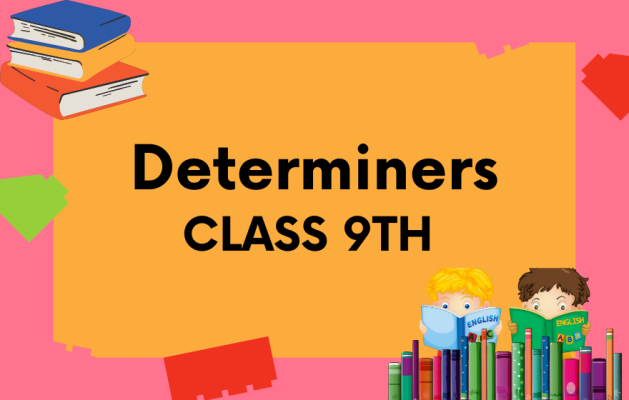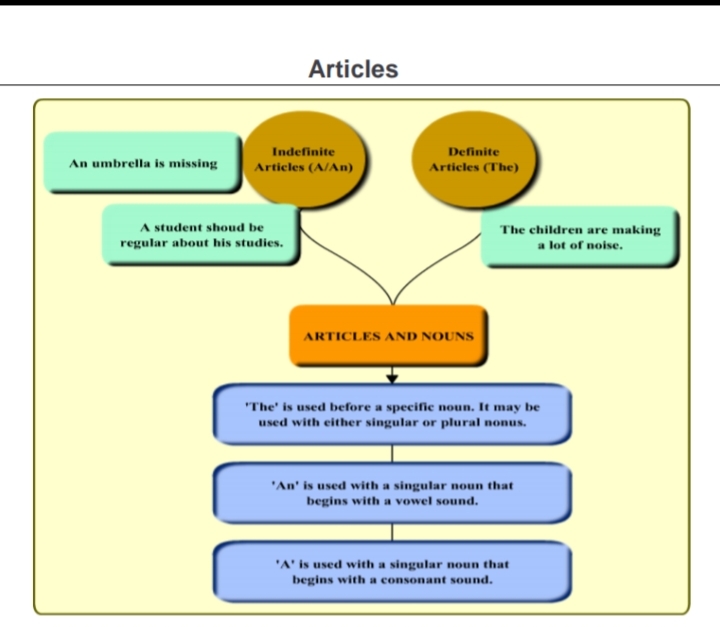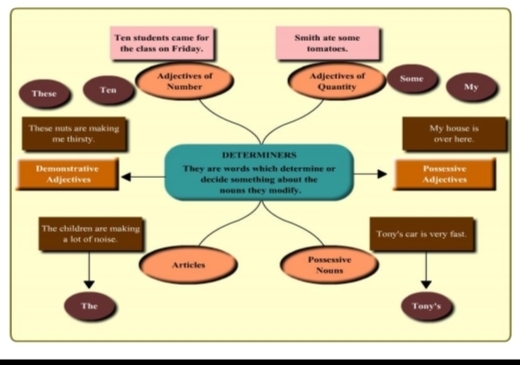We, in this article, will provide you with Determiners for class 9th English grammar to help you improve your grammar skills and hence improve your vocabulary as well as your basic grammar knowledge will be polished.
Determiners class 9th is an important topic of English grammar, and we have provided notes of determiners along with some exercises on class 9th determiners. This will help you improve the basic fundamental grammar and your questions’ accuracy.
Determiners Class 9th English Grammar: Mind Map
We are sharing the mind map of Determiners class 9th to help the students go through the topic at one glance to help you build the concepts of class 9th determiners.
Determiners Class 9th English Grammar: Introduction
Determiners are words that come before nouns. They contain several classes of words, including pronouns and adjectives. They determine or limit the noun by giving some additional information about it. Determiners show whether a noun refers to is a general or a specific object, person, or place.
They indicate which or how many things the noun refers to. Determiners define or limit a noun to the singular or plural. They indicate the amount or quantity. Determiners and nouns together make noun phrases. They make noun phrases with adjectives too. Determiners may precede numerals too.
Determiners do not describe a noun; they determine or point it out. Look at these:
- the child
- every boy
- some politicians
- his picture
- my house
- those trees
- no politician
- some people
The words in bold letters are determiners.
Kinds of Determiners:
These classes of words make up determiners-
- Articles (a, an, the)
- Demonstratives (this, that, these, those)
- Possessives (my, our, your, his, her, its, their)
- Distributives (either, neither, each, every)
- Determiners of quantity and number (some, any, much, several, minor, less, enough, no) This class also includes – first, second, etc., many, either, neither, few, fewer
- Interrogatives (what, which, whose, etc.
- Examples:
- Malabar is a beautiful region.
- Some students missed their class.
- Our children are well-mannered.
- All winners of the awards were present.
- This book is too old.
Determiners Class 9th English Grammar: Use of Articles
A, AN
- A and An are used before countable nouns in the singular number, e.g. a question or an answer. A and An are used before a noun to show that it is not specific.
- A is used before consonant sounds, e.g. a boy, a house, a chair, a man, etc.
- A is used if a word is spelled with a vowel but has a consonant sound, a unit, a university. Here ‘u’ has the consonant sound of ‘y’.
- A is used in the following expressions: a pity, a pleasure, a rage, a toothache, a noise, at a loss, a loud voice, a headache, a shame, in a hurry, a bad cold, a nuisance, etc.
- An is used before a vowel sound, e.g. an eel, an elephant, etc.
- An is also used if the word is spelled with a consonant but has a vowel sound,
- e.g. an hour, an honorable man.
THE
- The can be used with both countable and uncountable nouns.
- It is used to show that the noun is specific, e.g. The first railway line in India was laid in Maharashtra. The phone is out of order.
- The information I need is available on the net.
- The is used with a noun that has already been mentioned,
- e.g. I am looking for a student, (not specific)
- This is the student I was looking for. (specific)
- The is also used when a noun is preceded by a superlative adjective-the longest day.
- The is used for common nouns, e.g. the earth, the sun, the
- moon, and the sky.
- The is used with uncountable nouns if indicating specifics, e.g. the water is clean, the
- milk has gone sour.
- If an unspecific meaning is indicated, the is not used, e.g. Water is an important
- component of our food.
- The is used when we refer to a whole group of people-the, the Indians, the good, the bad.
- The is used before mountain ranges, rivers, canals, oceans, deserts, holy books, etc
- e.g. the Bible, the Himalayas, the Ganges, the Pacific Ocean.
- The is used before the names of newspapers, government departments, museums,
- and libraries, e.g. the Ministry of Health, The Times of India.
- The is not used before the names of persons, continents, cities, holidays, days of the
- week, months, subjects of study, etc. We cannot say the Obama, Asia, the New
- Delhi, February, etc.
- No articles are needed with the names of diseases, meals, languages,
- days, etc.
- e.g. It is wrong to say malaria, the dinner, The Wednesday, etc.
Determiners Class 9th: Exercises
1. Fill in the blanks using suitable determiners-
(a) (A/An/The) man went for
(b) (a/an/the) holiday to a place near
(c) (a/an/the) sea. He spent
(d) (every/all/some) his days watching the waves crash against the shore.
Answer:
(a) A
(b) a
(c) the
(d) all
2. Use of Demonstratives:
Demonstratives are pronouns that point out something. However, when they are followed by nouns, they act as determiners. this, that these those Notice the difference in their use as pronouns and determiners.
e.g. I want this, (pronoun) I want this book, (determiner because ‘this’ is followed by a noun.) ‘this’ and ‘that’ is singular,
e.g. this house, this card, that school, that child ‘these’ and ‘those’ are plural.
e.g. these children, these posters, those parents, those buildings.
Identify the demonstrative pronouns and the demonstrative determiners in the
following sentences. Write against each sentence whether the underlined word is a
pronoun (P) or a determiner (D).
- These are my cousins.
- I want only that and nothing else.
- Those birds are from Siberia.
- This is a dirty old trick.
- All these children are participating in the activity.
- I need these articles urgently.
Answer:
- These are my cousins. (P)
- I want only that and nothing else. (P)
- Those birds are from Siberia. (D)
- This is a dirty old trick. (P)
- All these children are participating in the activity. (D)
- I need these articles urgently. (D)
- Use of Possessives:
Possessives are pronouns that indicate that a thing belongs to someone: mine, ours, yours, his, hers, its, theirs
e.g. This is mine, and that is yours. However, if the possessives are followed by nouns, they are possessive determiners, e.g. his face, her smile, their happiness, my child, our house, your blessings
Identify the possessive pronouns and the possessive determiners in the following sentences. Write against each sentence whether the underlined word is a pronoun (P) or a determiner (D).
- This book is his, not mine.
- My son is coming today.
- These flowers are ours.
- Those fruits are yours.
- His brother is going to the United States.
- Her smile is radiant.
Answer:
- This book is his, not mine. (P)
- My son is coming today. (D)
- These flowers are ours. (P)
- Those fruits are yours. (P)
- His brother is going to the USA. (D)
- Her smile is radiant. (D)
- Use of Distributives:
Each, Every, All
Every indicates a single unit in a group. Each refers to individual members of a small group, while every member of a large group. Sometimes, everyone can be used, e.g., each of his five brothers was learned.
Every Indian must vote.
Every/Each one was given aid.
All are used to indicate the whole group rather than its components, e.g. All the students
of class XI A has passed.
Use Of Determiners of Quantity:
Many, Much, Some, Any
Many are used only with plural nouns and to show a large number.
Much is used with uncountable nouns indicating a large quantity.
FEW, A FEW, THE FEW
Few means very small numbers, not enough, and below expectation. A few indicate
some numbers. The few indicates very small specific numbers, e.g.
Few students are interested in learning languages.
A few students are good at English.
The few good students usually come from educated families. VII. Write two sentences for each given sentence using determiners of quantity, as shown above. Pay particular attention to the desired meaning. One has been done for you.
(i) Boys were able to speak good English.
(+) A few boys were able to speak good English.
(-) Few boys were able to speak good English.
Little, A Little
Look at these two sentences.
We had little rain this year.
We had a little rain this year.
Trim is used when the speaker wants to convey the meaning ‘not enough or below
expectation’. Little expresses a negative meaning.
A little is used when the speaker wants to convey the meaning a small amount but not
much. A little expresses a positive meaning.
SOME, ANY
Some and Any show not a very large quantity. Some are used in affirmative sentences, e.g. There is some water in the pitcher. Any is used in interrogative or negative sentences, e.g. Is there any water in the pitcher? There isn’t any water in the pitcher.
Now, look at these sentences.
- He hasn’t got any roses in his garden.
- There isn’t any milk left in the jug.
Any is used in negative statements with countable plural nouns like roses and uncountable nouns like milk.
2. Fill in the blanks in the following sentences with ‘some’ or ‘any’ as needed.
- Our players missed very good chances of scoring.
- The country mustn’t tolerate anti-national activity.
- There isn’t sense in our waiting here.
- We must do serious thinking about it.
- There is hardly any hope for his recovery.
Answer:
- some
- any
- any
- some
- any
Use of Interrogatives
Determiners that are used for framing questions are called interrogatives. ‘What’, ‘which’, ‘whose,’ ‘how much, ‘how many are interrogative determiners. whose house, which city, how many rulers, how much water, what money
3. Fill in the blanks by using suitable interrogatives.
- In …………….. book, do we find the character Quasimodo?
- To ……………. notes are you referring?
- ……………….. baskets are meant for fruits?
- ………………. names have you given to the twins?
- ………………. students are there in the zonal football team?
- ………………… flour is needed to make a cake for ten people?
- ………………. books did you read during the summer vacation?
- ……………….. bat is heavier, Sachin’s or M.S. Dhonis?
Answer:
- which
- whose
- Which
- What
- How many
- How much
- Which
- Whose
Fill in the blanks with suitable determiners.
(a) ……………….. abbreviation is (b) ……………… shortened form of (c) ……………… word or a group of words. It is used to save time and space. (d) ………………… abbreviations are also used while speaking. Most of (ie) dictionaries include (f) ……………. list of commonly used abbreviations.
Answer:
(a) An
(b) the
(c) a
(d) Some
(e) the
(f) a
Complete the passage using determiners.
We only take (a) ……………… few seconds to pass through (b) ……………. earth’s atmosphere which is hardly thicker than (c) ……………. skin of (d) ………………. plum or (e) ……………… peach. As we pass through, we gradually leave behind particles of air, dust which scatter (f) …………….. sun’s light and make the sky look blue.
Answer:
(a) a
(b) the
(c) the
(d) a
(e) a
(f) the
Complete the passage with suitable determiners.
My friend lived on (a) ……………. the first floor of (b) ……………. recently renovated old house on (c) ………….. river Beas. She was afraid of burglars and always locked up (d) ……………… house carefully before going to bed. She also took the precaution of looking under (e) …………….. bed to see if (f) …………….. burglar was hiding there.
Answer:
(a) the
(b) a
(c) the
(d) the
(e) the
(f) any
Complete the following passage with suitable determiners.
I have met (a) ……………. people in my life, but (b) …………… person who has influenced me (c) ………….. most is Mother Teresa. To me, she has been (d) ……………. symbol of true religion, (e) people can do what she has done. If we adopt (f) …………….. ideology, the world would become a better place to live in.
Answer:
(a) many
(b) the
(c) the
(d) a
(e) Few
(f) her
Fill in the blanks with determiners.
(a) ………………. entire polling station seemed to be (b) ……………….. vast mass of humanity. It was (c) ……………….. public holiday, (d) …………….. old man insisted on talking to (e) ……………… polling officer. He refused to show (f) ……………… identity slip.
Answer:
(a) The
(b) a
(c) a
(e) the
(f) his
Complete the following passage with suitable determiners.
Our principal is (a) …………… man of honesty and integrity. He does not accept (b) ……………. gifts from students, teachers, or parents. On (c) ………………. occasion of (d) …………….. Children’s Day, he rewarded (e) …………….. students for (f) ……………….. honesty.
Answer:
(a) a
(b) any
(c) the
(d) the
(e) many
(f) their
Fill in the blanks with suitable determiners.
You’re going to take life away from (a) …………….. man with (b) …………… belief that you will give it back. This is (c) ………………. enormous step, (d) …………….. precious life is at stake. You must perform to the best of (e) …………… ability to save (f) ………………. the patient’s life.
Answer:
(a) a
(b) the
(c) an
(d) A
(e) your
(f) the
Fill in the blanks with suitable determiners.
John Boyd Dunlop did not have (a) ……………. sturdy health which (b) ……………… farmer requires. So his parents let him study for (c) ………………. another profession. Therefore, he chose veterinary medicine and took (d) ………………. diploma in it from Edinburgh.
Answer:
(a) the
(b) a
(c) some
(d) a
Fill in the blanks using determiners.
(a) Doubt was not (i) ………….. new emotion. It was (ii) ……………. oldest enemy. Yet I had not expected it to come this way. I had become accustomed to (iii) ……………… presence in (iv) ………….. being. (b) There are (i) …………… broken chairs in (ii) …………….. corner of (iii) …………….. room. (c) There is (i) ……………… egg on this plate.
Answer:
(a) (i) a
(ii ) my
(iii) its
(iv) my
(b) (i) some
(ii) the
(iii) this
(c) (i) an
Conclusion
We have provided Determiners for class 9th English Grammar topic to help the students with the grammar skills and some Determiners class 9th basic exercises to help the students grasp the concept thoroughly.
Related Articles



